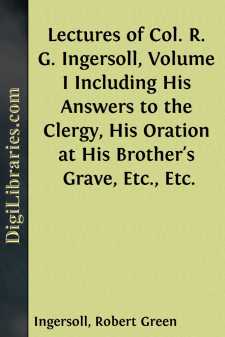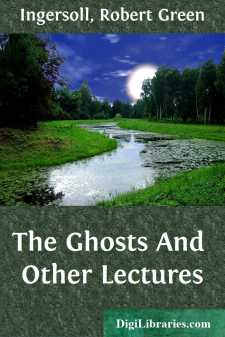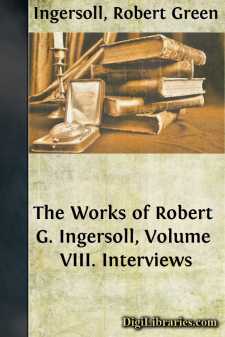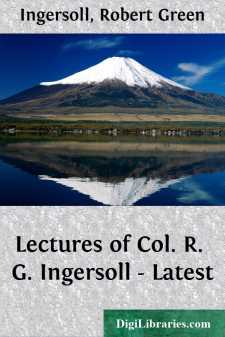Categories
- Antiques & Collectibles 13
- Architecture 36
- Art 48
- Bibles 22
- Biography & Autobiography 813
- Body, Mind & Spirit 142
- Business & Economics 28
- Children's Books 17
- Children's Fiction 14
- Computers 4
- Cooking 94
- Crafts & Hobbies 4
- Drama 346
- Education 46
- Family & Relationships 57
- Fiction 11829
- Games 19
- Gardening 17
- Health & Fitness 34
- History 1377
- House & Home 1
- Humor 147
- Juvenile Fiction 1873
- Juvenile Nonfiction 202
- Language Arts & Disciplines 88
- Law 16
- Literary Collections 686
- Literary Criticism 179
- Mathematics 13
- Medical 41
- Music 40
- Nature 179
- Non-Classifiable 1768
- Performing Arts 7
- Periodicals 1453
- Philosophy 64
- Photography 2
- Poetry 896
- Political Science 203
- Psychology 42
- Reference 154
- Religion 513
- Science 126
- Self-Help 84
- Social Science 81
- Sports & Recreation 34
- Study Aids 3
- Technology & Engineering 59
- Transportation 23
- Travel 463
- True Crime 29
Robert Green Ingersoll
Robert Green Ingersoll (1833–1899) was an American lawyer, orator, and writer, widely known as "The Great Agnostic" for his outspoken critiques of religion and advocacy of secularism. He championed freethought, humanism, and civil liberties, often delivering powerful speeches promoting science, reason, and individual rights. Some of his famous works include "The Gods" and "Some Mistakes of Moses," where he challenged traditional religious beliefs. Ingersoll's eloquence and wit made him a prominent figure in the 19th-century intellectual and cultural landscape.
Author's Books:
Sort by:
INGERSOLL'S LECTURE ON GODS Ladies and Gentlemen: An honest god is the noblest work of man. Each nation has created a god, and the god has always resembled his creators. He hated and loved what they hated and loved, and he was invariably found on the side of those in power. Each god was intensely patriotic, and detested all nations but his own. All these Gods demanded praise, flattery, and...
more...
PREFACE. These lectures have been so maimed and mutilated by orthodox malice; have been made to appear so halt, crutched and decrepit by those who mistake the pleasures of calumny for the duties of religion, that in simple justice to myself I concluded to publish them. Most of the clergy are, or seem to be, utterly incapable of discussing anything in a fair and catholic spirit. They appeal, not to...
more...
THE BIBLE AND A FUTURE LIFE Question. Colonel, are your views of religion based upon the Bible? Answer. I regard the Bible, especially the Old Testament, the same as I do most other ancient books, in which there is some truth, a great deal of error, considerable barbarism and a most plentiful lack of good sense. Question. Have you found any other work, sacred or profane, which you regard as more...
more...
Ladies and Gentlemen:—It so happened that the first speech—the very first public speech I ever made—took occasion to defend the memory of Thomas Paine. I did it because I had read a little something of the history of my country. I did it because I felt indebted to him for the liberty I then enjoyed—and whatever religion may be true, ingratitude is the blackest of crimes. And whether there is...
more...





